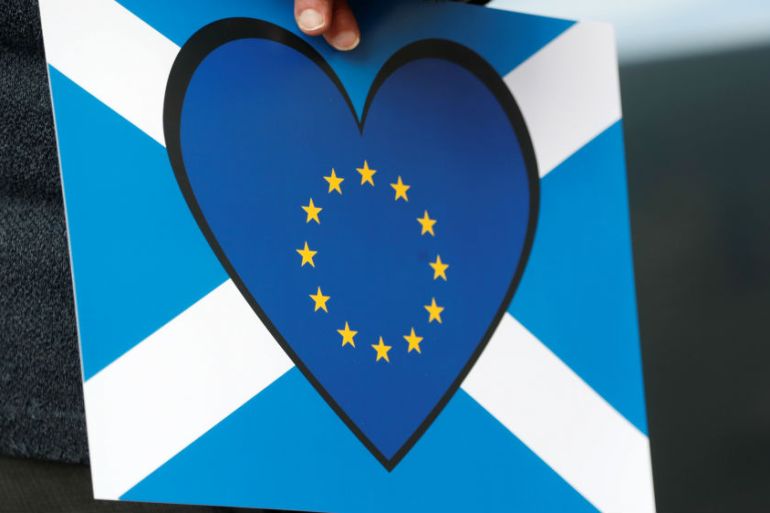European families ‘feel safer’ in Scotland than England
Reassurances from officials and local-born residents have gone a long way to allay fears among EU nationals in Scotland.

European Union nationals living in Scotland feel safer than their fellow EU citizens living in England, according to new research to be published on Tuesday.
Researchers examining the effect of the United Kingdom’s withdrawal from the EU studied more than 170 families currently or formerly living in the UK.
Keep reading
list of 4 itemsWhy are British farmers pleading for a universal basic income?
Northern Ireland agreement could end deadlock, restore government
Forced to become British: How Brexit created a new European diaspora
“While frustration, anxiety, and disappointment are shared by all participants, we found a stark difference on how EU nationals feel about post-referendum Britain whether they live in England or Scotland,” said lead author Professor Nando Sigona, from the University of Birmingham.
Most interviewees in Scotland said the atmosphere in Scotland during the EU referendum campaign and in its aftermath was not hostile, or less hostile, towards them – in comparison to what they heard or had experienced in England.
Words of reassurance in the wake of the Brexit vote went a long way in assuaging fears of EU nationals living in Scotland, the report – EU families in Scotland after the Brexit referendum: Fears, hope and belonging – suggests.
“I want to take the opportunity this morning to speak directly to citizens of other EU countries living here in Scotland – you remain welcome here, Scotland is your home and your contribution is valued,” Scotland’s First Minister Nicola Sturgeon said in the days following the 2016 result.
A Romanian couple living in the UK since 2008 and with a UK-born child explained how the reassurance came not only from politicians but also ordinary people.
“The Scottish people were very very willing to make their opinion on Brexit clear to us,” said the couple quoted in the report.
“They said, ‘Oh, I am so sorry about what happened’ and they were really wanting to try to convince us of the fact that they want us here and they don’t want us to feel unwanted just because of how the vote went.”
I just couldn't - I just couldn't work out what was going to happen to us
More than three million non-British EU citizens have been living in what the report calls “legal limbo” since the 2016 referendum.
“We were devastated,” a British woman with a French husband told the researchers.
“So I was nine months pregnant when the vote happened and we stayed up all night and watched it and we were both just crying when it came through and then the next day I was exhausted and I just couldn’t – I just couldn’t work out what was going to happen to us. We were kind of terrified, wondering if he was going to get sent away and if we would have to be separated.”
Sigona said EU citizens were “worried about Brexit and what it will mean to them and the future of their children”.
“But they also feel at home in Scotland, more than elsewhere in the UK,” he added. “They feel valued for their contribution. More importantly, they feel they can belong to the Scottish Nation because this is not in opposition with being also French, Italian, Polish and European.”
The research team conducted semi-structured in-depth interviews with 132 EU families currently living in the UK and 40 more who previously lived in the UK. The sampling was informed by the profile of the populations of non-UK EU nationals in the UK, both in terms of its distribution in England, Wales, Scotland and Northern Ireland and composition with regard to countries of origin.
Scotland voted by 62-38 percent to remain in the European Union, a fact from which EU residents have taken comfort, the report concluded. But there is a wider sense that the Scottish identity is more inclusive than the English one – the 2014 Scottish Independence referendum stimulated a wide conversation around identity and belonging that also involved EU nationals, who had the right to vote – unlike in the Brexit referendum two years later.
The two-year study was funded by the Economic and Social Research Council (ESRC) as part of The UK in Changing Europe initiative and conducted at the University of Birmingham’s Institute for Research into Superdiversity (IRIS), with the collaboration of Migrant Voice and The 3 Million.
“This research shows that EU migrants in Scotland feel somewhat different than those in England,” said Nazek Ramadan, director of Migrant Voice.
“Whether it is public awareness or Scottish government involvement, EU migrants feel significantly more welcomed in Scotland than compared to the rest of the UK. But, nevertheless the research also shows there are worrying trends, such as the declining socio-economic status of EU citizens, a fall in number of births and a falling EU citizen population in the UK due to the Brexit situation.
“Migrant Voice calls on policymakers across the UK to take note of this research and work to ensure that all migrants to the UK feel safe and comfortable, and have a chance at a good and prosperous life.”